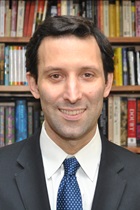The American Society of Hematology Honors Benjamin L. Ebert, MD, PhD, with the 2017 William Dameshek Prize

(WASHINGTON, August 24, 2017) – The American Society of Hematology (ASH) will present the 2017 William Dameshek Prize to Benjamin L. Ebert, MD, PhD, of Harvard Medical School, Brigham and Women’s Hospital, and Dana-Farber Cancer Institute for his seminal discoveries in multiple areas of non-malignant and malignant hematology.
The William Dameshek Prize is awarded to an early- or mid-career hematologist who has made a recent outstanding contribution to the field of hematology. This prize is named after the late William Dameshek, MD, a past president of ASH and the original editor of Blood. ASH President Kenneth C. Anderson, MD, a former recipient of this award, will present this award to Dr. Ebert on Tuesday, December 12, during the 59th ASH Annual Meeting and Exposition in Atlanta.
Dr. Ebert is a Professor of Medicine at Harvard Medical School. He serves as Leader of the Leukemia Program for the Dana-Farber/Harvard Cancer Center, an Institute Member at the Broad Institute, and an Associate Physician at Brigham and Women’s Hospital. He has recently been appointed Chair of Medical Oncology at Dana-Farber Cancer Institute.
Dr. Ebert is notable for his leadership in describing the genomic landscape of adult myelodysplastic syndromes (MDS), including identifying critical new roles for ribosomal dysfunction. Specifically, he identified RPS14 as a key gene for deletion 5q MDS. His laboratory discovered the molecular basis of lenalidomide activity in MDS as well as multiple myeloma. Recent studies have characterized clonal hematopoiesis and its contribution to both hematologic malignancies and cardiovascular disease. Along with human genetic studies, Dr. Ebert’s lab has made significant contributions to understanding the biological basis of transformation of hematopoietic cells by somatic mutations. His work has demonstrated creativity, innovative methodology, and direct human relevance.
Before beginning his medical career, Dr. Ebert was a Rhodes Scholar, during which time he studied oxygen-regulated expression of the erythropoietin gene at Oxford with Peter Ratcliffe. He received his MD from Harvard Medical School in 1999, completed his internship and residency at Massachusetts General Hospital in 2001, and went on to complete his clinical fellowship in hematology and oncology at Dana-Farber Cancer Institute. Dr. Ebert completed his postdoctoral research fellowship with Todd Golub at the Broad Institute of Massachusetts Institute of Technology and Harvard University in 2007.
Dr. Ebert is an active member of ASH. He is currently co-chair of the ASH Task Force on Precision Medicine, and has served as Scientific Program Co-Chair for the 2014 ASH Annual Meeting and chair of the ASH Committee on Myeloid Biology in 2012. He is currently President of the American Society of Clinical Investigation and a member of the Association of American Physicians. He has served on editorial boards, including Blood. In addition to the William Dameshek Prize, his awards include the Harvard Medical School Young Mentor Award, the Harvard-MIT Health Sciences and Technology Program Thomas A. McMahon Mentoring Award, and the International Society for Experimental Hematopoiesis Till and McCullough Award.
“The Society is honored to recognize Dr. Ebert as one of the leading young investigators in hematology,” said ASH President Kenneth C. Anderson, MD, of the Lebow Institute for Myeloma Therapeutics and Jerome Lipper Myeloma Center at Dana-Farber Cancer Institute in Boston. “Dr. Ebert is a rising star who has used innovative scientific approaches to transform our basic understanding of hematopoiesis, which have already translated to novel treatment paradigms in myelodysplasia and bone marrow failure disorders, and will impact a much broader range of diseases in the future.”
The American Society of Hematology (www.hematology.org) is the world’s largest professional society of hematologists dedicated to furthering the understanding, diagnosis, treatment, and prevention of disorders affecting the blood. For more than 50 years, the Society has led the development of hematology as a discipline by promoting research, patient care, education, training, and advocacy in hematology. ASH publishes Blood (www.bloodjournal.org), the most cited peer-reviewed publication in the field, which is available weekly in print and online. In 2016, ASH launched Blood Advances (www.bloodadvances.org), an online, peer-reviewed open-access journal.
CONTACT:
Sara Khalaf, American Society of Hematology
[email protected]; 202-552-4925